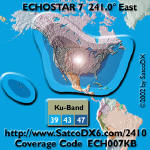Satellite footprints and EIRP for North American satellites
Satellite reception depends on many variables. One of the most important
factors is satellite dish size. Most of the satellites over North America can be
received with the dish that comes with the system you purchase. Occasionally,
consumers may want receive a channel on a satellite that is either further away
on the arc (signal is weaker) or the coverage of the satellite (footprint) is
limited.
Here below is a map displaying signal strengths for a satellite signal. The
value used is EIRP. What you need to look for, is that each line represents a
signal strength, and this is the deciding factor on what size antenna you
require. The further the line is from the center, the weaker the signal will be.
But the bigger your dish size is, the more of the signal you can receive.
Many want to know the dish size best for them in
their region. This section tries to simplify the process. The EIRP (Effective
Isotropic Radiated Power) value indicates the strength of the signal from the
satellite from your location.
If you can find a dish that is one size larger than what the EIRP value states
from your location, it is suggested you choose it. This is simply because Ku
band transmission for satellite TV may be affected by weather and other
conditions.
|
97.0°W
|
Telstar 5
|

|
pdf |
 |
|
101.0°W
|
AMC 4
|

|
pdf |
 |
|
119.0°W
|
EchoStar 7
|

|
|
 |

|
Ku-Band DVB |
|
EIRP
dB |
Residential |
Commercial |
|
50 |
55cm |
75cm |
|
48 |
75cm |
90cm |
|
46 |
80cm |
90cm |
|
44 |
90cm |
1m |
|
42 |
1m |
1.2m |
|
41 |
1.2m |
1.5m |
|
40 |
1.5m |
1.8m |
|
39 |
1.8m |
2.0m |
|
38 |
1.8m |
2.4m |
